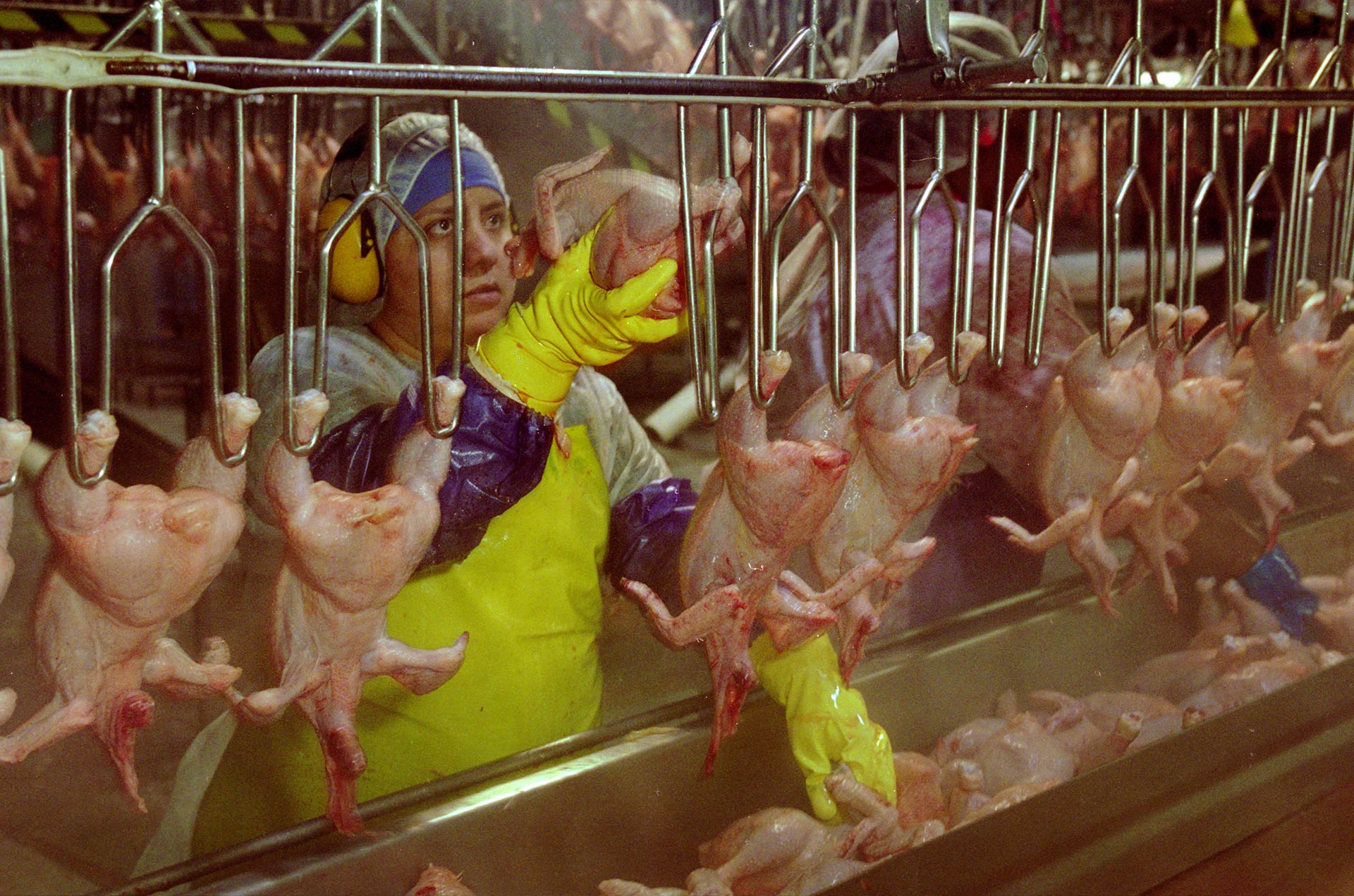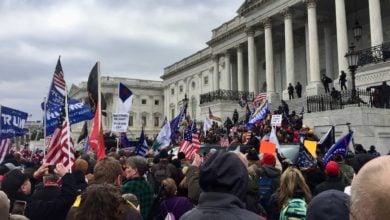
Walkouts, sickouts, sit-ins, picket lines and other forms of protest are sweeping the country from New York to Alabama to California. Essential workers are taking the initiative to demand the on-the-job protective equipment and support necessary to protect themselves against the COVID-19 virus and survive.
The strike wave is an angry response to a corporate establishment that has shown no social obligation to them during the pandemic, and to a federal government which has given trillions of dollars to the banks, but has instituted no regulations for workplace safety against COVID-19.
The following is just a sample of the wave of struggle that many feel may be just beginning.
Factory worker: Hey GE, ‘we can make ventilators’
GE workers in Schenectady, New York, Dallas, Tx, Lynn, Ma. and Salem, Va. have staged protests to demand that the company refit the plants to make desperately needed ventilators and other medical equipment. The protestors explained that added production would be a win-win because it would not only supply hospitals but save jobs. GE has already proceeded with layoffs, and is threatening to furlough a large part of its work force.
“Instead of laying workers off, GE should be stepping up to the plate with us to build the ventilators this country needs,” said Carl Kennebrew, president of the Industrial Division of the Communications Workers of America (IUE-CWA ), which represents the workers. “In the plants that are up and running, GE also needs to keep workers safe on the job.”
Nurse: Lack of PPE is like ‘fighting a war with plastic guns’
As of April 14, over 9,000 health care workers have tested positive for COVID-19, with at least 27 deaths, according to the Center for Disease Control, which calls this number “understated.”
Health care workers everywhere are on the front lines not only in the struggle against COVID-19, they must also struggle to get their own management to give them personal protective equipment to keep them safe.
At the Montefiore Medical Center in the Bronx, NY, nurses protested outside to say they’re frightened for their lives, holding signs demanding more PPE. One health care worker explained: “This is outrageous that we have people coming and sewing things for us, sewing masks, sewing shields, making things out of plastics…[T]hat would be like a soldier going to war and making a plastic gun to bring with him…This is the situation. And the public needs to know because they have to demand that we get the things that we need so that we can take care of people.”
They not only have to worry about catching the disease, they risk losing their jobs if they speak out about the gross lack of safety procedures. Across the country doctors, nurses, hospital staff have been threatened with, or have been fired for speaking out or protesting lack of safety procedures and equipment.
Workers at two healthcare systems in New York City — NYU Langone and Montefiore Health System — were sent a memo obligating them to run all media requests by their public relations department. Failing to do so would subject them to “disciplinary action, including termination,” said the memo.
A nurse at Chicago’s Northwestern Memorial Hospital even lost her job for sending an email to colleagues urging them to wear more protective gear! The nurse has since filed a lawsuit against the hospital.
Poultry worker: Unsanitary conditions hurt us & the public
At food processing plants in Illinois, Virginia, Colorado, Georgia, including thousands of immigrant workers, walked out in late March to protest unsafe working conditions.
At the Pilgrim’s Pride chicken processing plant In Timbersville, VA, workers demanded that the company shut down to sanitize the plant allow workers exposed to COVID-19 to self-quarantine for two weeks. These actions highlight not only the dangers the workers are exposed to, but the public as well, as the company tried to continue food processing in an unsanitary environment.
“Workers in poultry plants, where there may be over 1,000 workers a day, work very close together, sometimes shoulder to shoulder with knives and scissors, making thousands of cuts a day to produce the chicken pieces we buy in the supermarkets,” says former Obama-era OSHA Chief of Staff Debbie Berkowitz.
On March 23, workers at the Perdue Farms in Perry, Georgia, walked out of the plant after being told by management to work more hours without a pay increase during the COVID-19 pandemic, and for increased worker protection after several workers tested positive. They won from Perdue a promise to: sanitize the factory every 24 hours; increase cleaning protocols; increase paid sick time to four weeks and the right for workers with COVID-19 to quarantine for 14 days with pay.
Fast food worker: ‘We won’t put our lives on the line for pizza’
Other fast-food workers, delivery people, warehouse workers and other food-service related workers have spontaneously organized protests across the country, demanding PPE, hazard pay, sick pay and other needed services.
At least 30 supermarket employees have died as a result of COVID-19, according to the United Food and Commercial Workers International Union. Another 3,000 have called out of work after showing signs of virus-related illness. These figures are understated because they don’t include the many thousands of non-union grocery workers, who lack health insurance. Thousands have protested, taken off work, organized “sick-outs” to press the companies to institute safety procedures. Among these are Whole Foods and Instacart.
The long list of protests across the country of fast-food workers demanding PPE, hazard pay and paid medical leave is a tribute to their fighting spirit. In California alone, 30 fast food restaurants walked out on April 9. Their work is considered “essential” by the corporate world but their lives are not. The strike has hit McDonald’s, Burger King, Taco Bell, Pizza Hut, Subway, Popeye’, Domino’s, Target delivery service, Walmart, Food Lion, Whole Foods, Instacart and others.
As one Domino’s Pizza worker in Los Angeles explained: “We have no masks and no gloves and will no longer put our lives at risk for pizza,” he said. “I’m joining our colleagues at McDonald’s in demanding two weeks of self-quarantine, with full pay, and for Domino’s to pay health care costs if I, or any of my immediate family members, get sick with the coronavirus.”
Currier: ‘All bosses care about is money’
Many Amazon warehouse workers in Staten Island, NY, and Instacart’s grocery delivery workers nationwide walked off their jobs on March 30, demanding more PPE and pay as they continue to work. Other Amazon actions took place in Detroit and Chicago.
Several workers at Amazon’s Staten Island facility have been diagnosed with COVID-19. In response Amazon stated that it was “tripling down on deep cleaning, procuring safety supplies that are available … and in Staten Island we are now temperature checking everyone entering the facility.”
It took a fight for Instacart to say it would begin distributing hand sanitizers to workers. The struggle for worker safety continues.
On April 8 hospital couriers in Northern Colorado held a protest and a sick out over lack of protective equipment while transporting COVID-19 samples to hospitals for testing, and delivering medicine to homes of people who have tested positive. A letter to management explaining the dangers of the job and demanding an additional $4 per hour in hazard pay said, “It’s very upsetting to be on the dock at a hospital picking up packages and having a funeral director wheeling out the deceased past you.”
The company has been unwilling to meet any of the demands, and has threatened firings. “They say we’re essential, but we’re really not,” one worker said. “They don’t care about us. All they care about is making money.”
On March 27, after two workers tested positive, 40 percent of the workers at the North Texas mail processing facility walked out over safety measures; the following day 60 percent called in sick. Management subsequently promised to follow safety guidelines and alter work procedures.
Government unresponsive
After many weeks of massive layoffs and thousands of COVID-19 deaths, Congress finally passed the “Corona Virus Aid Relief and Economic Security Act” on March 27. While granting a massive gift to Wall St. and the banks, this act did promise some financial relief to working people. Additionally, Congress has mandated two weeks paid sick leave, but restricted it to those who test positive and exempts companies with over 500 workers.
This bill, backed by both the Republican and Democratic party establishments, doesn’t address the crying need for the millions of essential workers to be immediately protected from the deadly virus. Instead of mandating clear on-the-job procedures and supports, the bill limits the Occupational Safety and Health Administration to issuing an “Emergency Temporary Standard within 30 days” to protect only health care workers from viral exposure. And even then, a permanent set of standards won’t have to be in place until six months later. Many will die in that period.
The Democrat and Republican politicians argue over issues, each eager to place the blame on each other. But like the corporations, they are leaving essential workers to fend for themselves. The message from both the halls of Congress and the caverns of Wall Street is that these workers’ jobs may be essential, but their lives are not.
The struggle will continue and intensify. The coronavirus crisis is revealing that the profit-driven capitalist system does not work for the working people.






